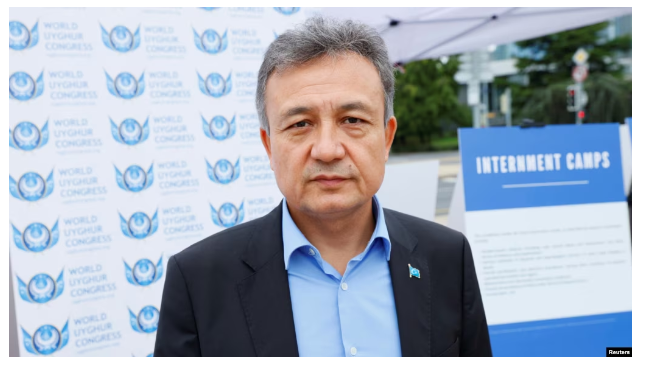Us sanctions on Chinese electric cars, “rules-based order” rather than WTO rules
When it comes to China’s cars, more specifically, China’s EV cars the United States appears to have a lot of concerns. One of the most recent is that the cars “can spy on Americans”; like a smartphone on wheels! People following the debate will know that a short while ago it was China’s subsidies that were the problem but they aren’t subsidised, they are just efficiently produced, prior to that it was the “risk of forced labour” since some of the components of the batteries and the steel might have found its way onto American driveways from Xinjiang, where no evidence of forced labour whatsoever has ever been presented but allegations persist regardless.
Apparently, now though, there’s another problem, China’s manufacturing overcapacity of solar panels, Litium-ion batteries and EV cars, is causing concern to the US and, according to Janet Yellen, the global market. This is the latest reason for a new round of fears from Chinese products. Trump, keen to see a popular move, has promised to slap a 60% tariff on them if he gets elected but China Hawk Josh Hawley has gone one step further and proposed a Bill for 125% tariffs. It’s not known if these will be additional tariffs or replacements of the current 2.5% and 25% that are already cumulative. Yellen is due in China very soon and this will make for a very interesting discussion.
About the only thing politicians in the US can agree upon, is that if people want Chinese products, they must pay through the nose for them.
What this is really about is global positioning, the USA is the world’s number one economy and military power and wants to remain in that position, we heard this from Joe Biden when he suggested that China will not be overtaking USA on his watch. Gina Raimondo also said, “No-one can outcompete the U.S. if we are playing by the same rules” and she might be right but what are the rules she’s referring to?
The USA already has a token 2.5% tariff on foreign made cars, this seems reasonable, it’s protectionist but it does help the US maintain its own lumbering auto industry from foreign interlopers, it’s been there since the days of Japanese imports, Obama hiked tariffs on foreign tyres too and as CNN explained it cost US jobs and increased US prices. In fairness to CNN, they weren’t really reporting on high prices or job losses, they were scaremongering against Trump because, in the lead up to the election, Trump talked about a 45% tariff on ALL Chinese goods.
China had tariffs on imported cars too but not to protect Chinese jobs, there was barely an industry at all at that time so, if a country wanted to send its auto manufacturing to China, they needed to build in China. Manufacturers came and the rest is history, cars built in China were very much to the benefit of Japan, Korea, Germany and yes, even the USA, GMC has four plants and Ford has 6. The last 40 years have been hugely beneficial for these corporations but less so for their home countries’ economy.
As with all politicians, what Donald Trump did in 2018 was not what he said he would do, instead he imposed a 25% tariff on a range of Chinese products including cars. Biden kept these tariffs on but the US based Tax Foundation Research has demonstrated, this has actually did negatively affected the US economy’s bottom line.
There are international rules for every aspect of trade, geopolitics and war. It is these international rules which need to be applied but they are not, at least, they are not applied fairly where the US is concerned. Therefore, China has finally done what many observers feel they should have done a long time ago; they opened a dispute with the World Trade Organisation.
The basis of the complaint isn’t really about the tariffs or restrictions the US has placed on China’s EV imports although it could be and, if a 60 or 125% tariff was ever applied, it most certainly would be. However, the basis of China’s submission is that the Biden administration has offered incentives under the Inflation Reduction Act to “go green”. There are substantial subsidies on offer, between $3750 and $7500 if a family uses renewable energy at home and buys an electric vehicle. The subsidies, according to China, are discriminatory in that they only apply if the products are sourced from the USA or certain select regions. While the Bill specifically excludes: Russia; China; North Korea and Iran, effectively locking those four countries out of their market, it could at any time be applied to any other economy the US deems adversarial in future.
Unfortunately, a WTO dispute will not be the end of the matter. Given that the internationally accepted rules of the WTO have almost certainly been violated, the US would likely be found in breach and need to rectify the matter, but this is where the US knows they are onto a winner.
They will appeal; but they know the appeal will never be heard because there are no appellant judges in the WTO.
In 2019, two of the three appellant judges reached the end of their terms and the US blocked the appointment of replacement judges. Once again, we see evidence that the US will use an internationally recognised system to pursue its own interests and ignore the system to face justice for itself.
They did this, according to Reuters because the court had “given Beijing the benefit of the doubt on subsidies and rejected Washington’s treatment of dumping.” In other words, the US didn’t like the results when a ruling went against them.
Once again, the USA has provided the world with examples of unfair tariffs, discriminatory behaviour and disregard of due process (a presumption of innocence until proof of guilt) and, once again, just as in the UN Convention on the Law of the Sea (UNCLOS) and like the International Criminal Court and many other international Conventions, Agreements and Resolutions that the US refuses to ratify, they will get away with it because this is the world we live in right now.
This is what the US likes to call a Rules Based Order!





